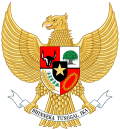| This article is part of a series on the |
| Politics of Indonesia |
|---|
 |
This is a list of central government agencies in Indonesia.
| This article is part of a series on the |
| Politics of Indonesia |
|---|
 |
This is a list of central government agencies in Indonesia.
According to the current Constitution, state institutions (Indonesian : Lembaga Negara) of Indonesia are as follow:
| Division of Powers | Institutions (in English) | Institutions (in Indonesian) | Roles |
|---|---|---|---|
| Executive | President and Vice President | Presiden dan Wakil Presiden | Heads of government |
| Legislative | People's Consultative Assembly | Majelis Permusyawaratan Rakyat | Bicameral national legislature |
| House of Representatives | Dewan Perwakilan Rakyat | Lower house of the legislature | |
| Regional Representative Council | Dewan Perwakilan Daerah | Upper house of the legislature | |
| Judicial | Supreme Court | Mahkamah Agung | Highest court of the land |
| Constitutional Court | Mahkamah Konstitusi | Constitutional review of a law, among others | |
| Judicial Commission | Komisi Yudisial | Maintaining the independence and welfare of the judges | |
| Examinative | Audit Board | Badan Pemeriksa Keuangan | Examine the state finance accountability |
The current Cabinet, formed on 21 October 2024, comprises the following 48 ministers: [1]
Coordinating ministries are tasked mainly to coordinate the various government ministries and other government institutions.
The following outlines non-ministerial government institutions:
The following lists unstructured institutions: [2]
Cabinet-level agencies are state and government institutions formed by the Constitutions and its subordinating laws whose roles and responsibilities are to support all government priorities and strategies set by the President. Each agency is headed by a ministerial-rank official who is not a member of the Cabinet but attends Cabinet meetings regularly. Cabinet-level agencies are: